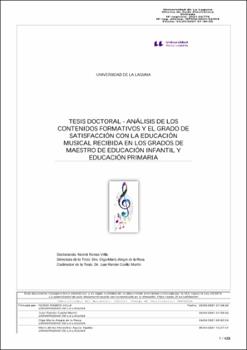Análisis de los contenidos formativos y el grado de satisfacción con la educación musical recibida en los grados de maestro de Educación Infantil y Educación Primaria
Author
Ramos Villa, NoemiDate
2021Abstract
ABSTRACT.
This PhD focused on demonstrating the favorable result that musical education can have
in the educational stage of a student. In addition, the opinion and degree of satisfaction
of the students and teachers within the university stage in the Degrees of Early
Childhood Education and Primary Education were directly assessed. On the other hand,
a tour was made through the study plans of different public and private spanish
universities, where we focused on the subjects related to music that contained these
Noemi Ramos Villa Página 5
degrees. Our eagerness to demonstrate the relationship that music and the teachinglearning process can reach, led us to carry out a mixed study, alternating the quantitative
methodology through questionnaires with the qualitative methodology, the latter being
through interviews and groups of discussion. In this way, not only were we able to find
out the answers to the questions raised in the questionnaires, but we also had the
opportunity to listen to their anecdotes and delve into aspects that with the quantitative
method, would not be possible. The results showed aspects that we already suspected.
Music Education is not considered relevant within teacher training, as well as within
student training. The teachers are aware of its importance and sometimes demand more
value from the subject of music. In addition, students highlight the monotony of the
subject. La presente tesis se enfocó en demostrar el resultado favorable que puede llegar a tener
la educación musical en la etapa educativa de un/a estudiante. Además, se valoró de
manera directa la opinión y grado de satisfacción del alumnado y profesorado dentro de
la etapa universitaria en los Grados de Educación Infantil y Educación Primaria. Por
otro lado, se hizo un recorrido por los planes de estudio de distintas universidades
españolas públicas y privadas detectando las materias referidas a música que
contuviesen dichos grados. Nuestro afán en demostrar la relación existente entre la
música y el proceso de enseñanza – aprendizaje, nos llevó a realizar un estudio mixto;
alternando la metodología cuantitativa a través de cuestionarios, con la metodología
cualitativa mediante entrevistas y grupo de discusión. De ese modo, no solo pudimos
conocer las respuestas a las cuestiones planteadas en los cuestionarios, sino que tuvimos
la oportunidad de escuchar sus anécdotas y profundizar en aspectos que con el método
cuantitativo, no sería posible. Los resultados mostraron aspectos que ya sospechábamos.
La Educación Musical no es considerada relevante dentro de la formación docente, así
como dentro de la formación estudiantil. El profesorado es consciente de su importancia
y en ocasiones reclaman más valor a la materia de música. Además, los estudiantes
resaltan la monotonía de la materia.





